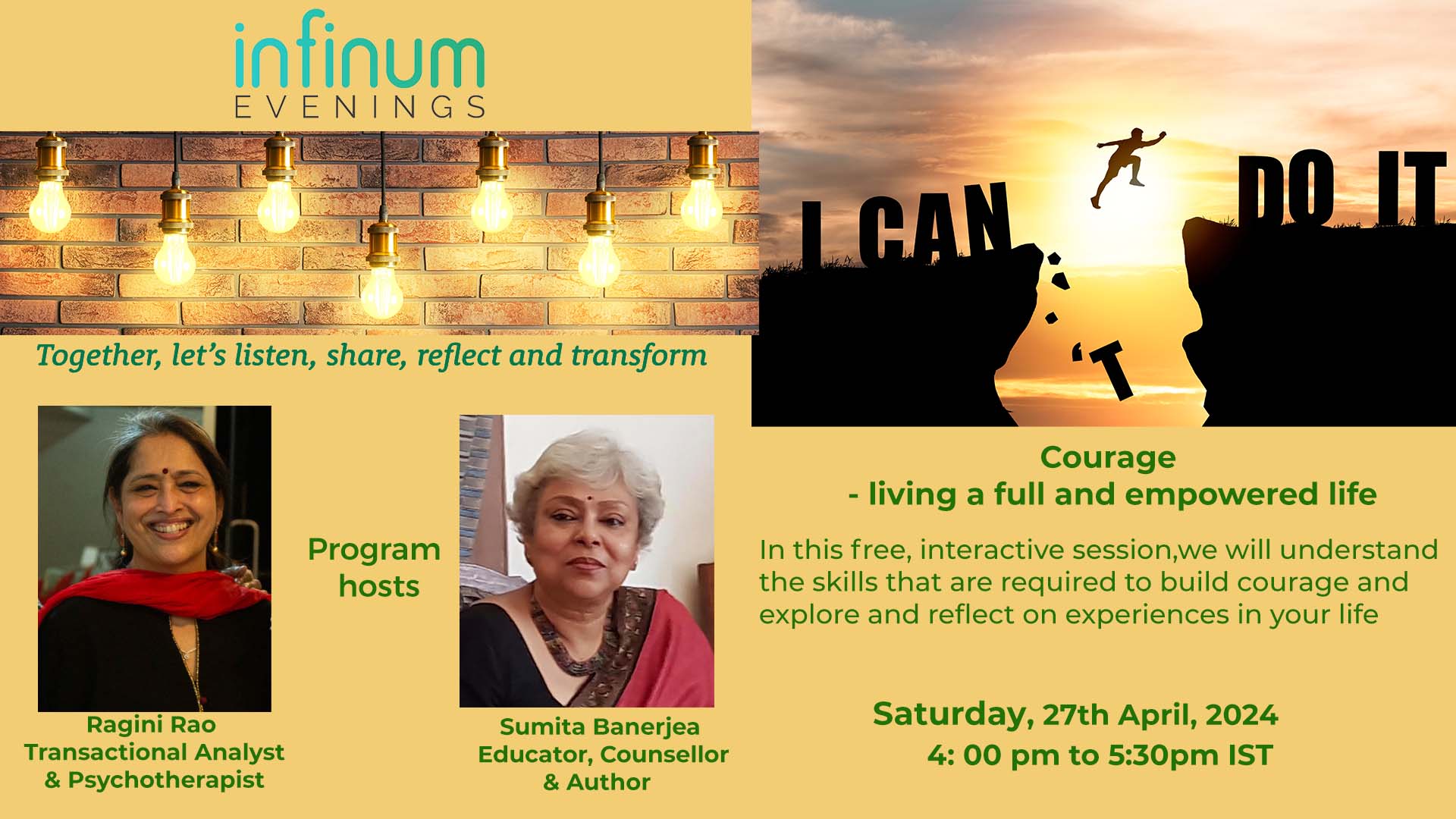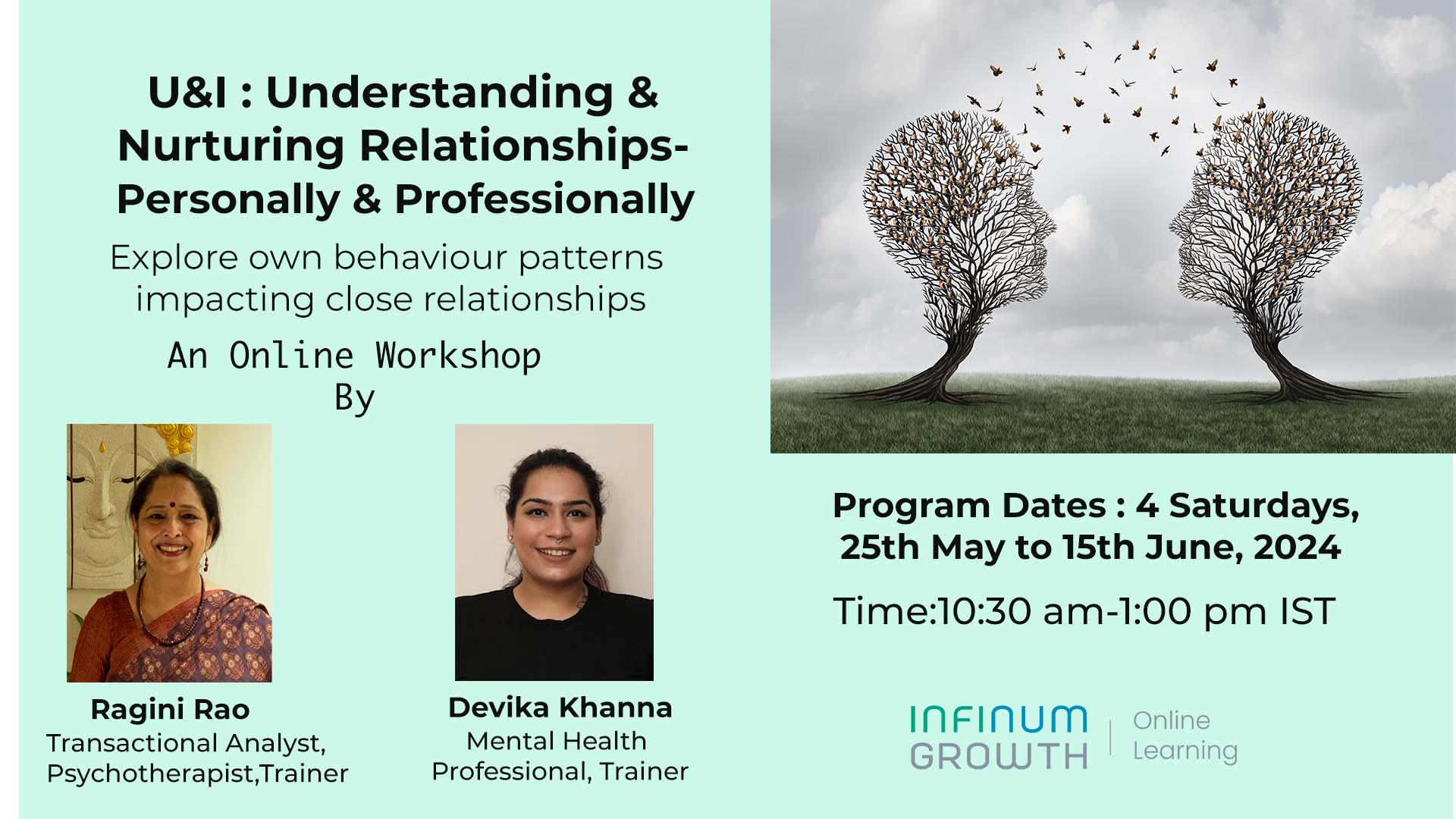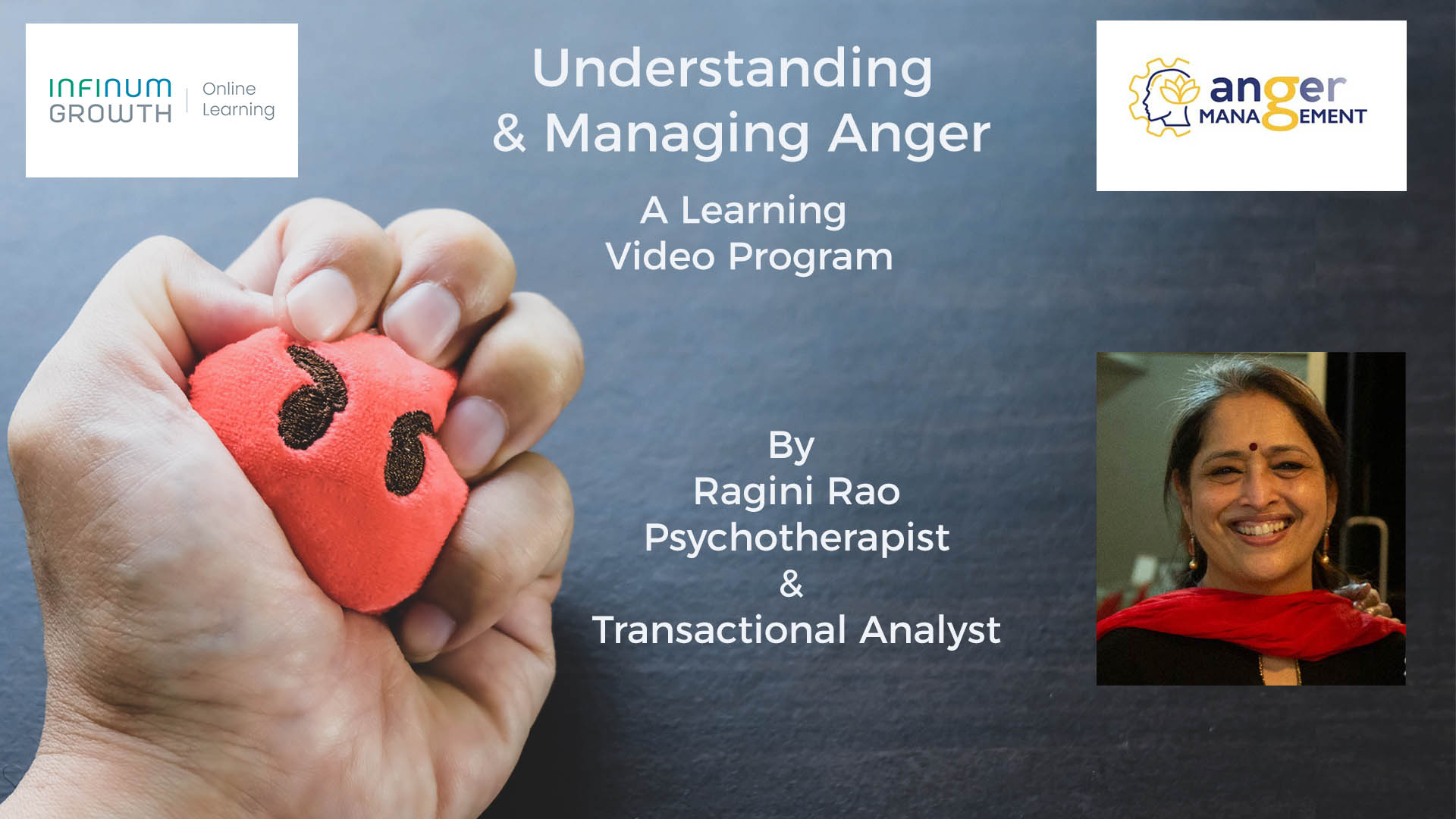Let’s start by looking at a conversation between a Mentor (M) and a Client (C) –
C : “I feel very guilty making any demand on my son. He is our only child and I don’t want him to feel burdened.”
M: “What do you feel guilty asking about?”
C: “Oh, I don’t ask for anything material. Fortunately we, the parents, can manage comfortably with what we have; and he is doing well too. But sometimes I ask him to call us at a particular time. Even when we go across (overseas) to meet him, I don’t want to intrude.“
“Occasionally he comes home for lunch when we are there, so that we go out for a meal together; or he takes us out in the evenings. He is so busy that, doing anything extra, I feel, is a pressure on him.”
M: “Do you actually believe that? You have been a career woman all your life, looked after your family, brought up your child; and your parents lived in another city. Did you too feel pressurised if your parents asked you to make some time for them – call them, visit them?”
C: “Even if I did, at times, I still did what I needed to. But times are different now. He is burdened with so many tensions, work related responsibilities. I feel scared that it will affect his health; And then, there is all this talk of giving the children space. I feel confused, about how much is too much!”
M: “Do you believe that he has some responsibilities towards both of you too? What would you, as parents, like him to do for you?
C: “Just be around a little more, for us. I know that is not possible physically all the time, but if he could visit us more often, even for a few days and talk to us more, so that we don’t feel cut off. Nowadays we talk once in three weeks or so.”
M: “Has he ever asked you not to make any ‘demands’ on him as you put it? Or told you that it causes him anxiety?”
C: “No, that he has not; but I can see that he is constantly on call, rushed for time, meeting a deadline; And that is what makes me hold back. Even when I do call, there is often an interruption when he has to attend to an urgent issue; and our conversation gets cut. Sometimes I feel I am trying to justify his behaviour for my own mental equanimity.”
M: “And how does that make you feel? Holding back, not telling him that you want him around a bit more, that you would like him to call you more frequently, be more a part of his life and vice versa?”
C: “Actually I feel distanced and sometimes I do feel hurt. I realize that I end up making polite conversations as I would with an acquaintance. So many things happen in our lives, but the effort of remembering them and conveying them does not happen. I feel, why bother, he is not really interested.”
M: “And what does that finally result in?”
C: “Probably trying to make peace with the fact that my job was to bring him up, nurture him and prepare him for life. And then let him go.”
M: “I can sense that you want to say something else.”
C: “Perhaps what I am saying is that, I cut the string of the kite and let him fly. I did not make him grounded, conscious of his responsibilities towards his parents. In giving him his freedom and being consciously, overly, non- intrusive, we drifted apart. The problem is mine.“
“We are now in the late autumn of our lives. Somehow we figure low in his list of priorities. It never seems the ‘right time’ to make time for us. There is always some overarching matter. I know that if there is some emergency, he will be there; but it seems a pity to wait for that.”
M: “Let me ask you how you feel, having made yourself available to your parents, when they were getting on in years?”
C: “I feel a lot of peace inside me. I feel happy too, because memories of the time spent together; just talking about mundane things, reliving small incidents that happened years ago, enjoying and cherishing our time together, is a source of strength for me.“
“I know that they felt wanted, needed and cared for in their sunset years too. For myself, I don’t live with any regret of not being there for them. There were situations when it was not easy carving out the time, but I knew they were waiting for me. That made me feel special too.”
M: “Have you told your son that you both wait for him to call or visit you and that you miss him when he does not?”
C: “No, I have not in so many words. I have told him that we are very happy to see him. But I don’t tell him my needs.”
M: “Do you think it would be a good idea to do that?”
C: “Yes, I suppose it would be. Perhaps I am scared of his response, of his trivialising my feelings.”
M: “Do you think it could be an assumption on your part?”
C: “It probably is. I don’t know. But yes, if I say it then I would know that I have expressed my needs. The rest is up to him. I know that I don’t live with guilt and regret regarding my role towards my parents. He has to decide his choice once I tell him what we miss.”
Parents and Adult children often drift apart, un-intentionally
The conversation quoted above is of a real case. It is representative of many such situations, where parents and children gradually become strangers to each other; because of a lack of regular meaningful communication; non-expression of genuine needs, not prioritizing the time and effort necessary for nurturing a relationship or taking things for granted. I am sure many more points can be added to this.
There is a phrase that I came across relating to what is called a psycho-social issue. The acronym is PICA – Parents in India, Children Abroad. Psychiatrists say that issues of depression, anxiety, loneliness, feeling of abandonment are often faced by such parents.
During and, as an aftermath of COVID 19, many of these issues became heightened because travel was a challenge and the miles separating the parents and the children seemed insurmountable – mentally and physically.
Counsellors have had cases of children living in far off lands, contacting them for help for their elderly parents living in India. In a certain section of society, Counselling as a safe place to talk about their fears and feelings and discuss ways of coping, is now fairly acceptable, for the senior generation facing this situation.
Some tips to prevent the drift in relationships
It is important to figure out why this drift happens, so that preventive and curative steps can be taken to deal with emotional pain and hurt.
Here are a few steps that could be taken to make things better –
- Technology has given us many options for communicating. Use them freely and set aside at least one specific time every week, suitable to both.
- Regular exchange of pictures and videos of events in each other’s lives. A young mother shares videos of what her children are doing, with their grandparents, three to four times a week; so that they feel included in the joyous experience of the children growing up.
- If there is a phone call or a message that is sent from either party, acknowledge it and say you will get back the moment you can; and actually do so. If the matter is urgent, then it should be mentioned in the message or the voice recording.
- It is advisable to know the emergency contact numbers of both parties who can be contacted, in case the party is unreachable for some reason.
- When talking, try and minimise complaints or advice. It puts people off.
- Share family news so that there is a feeling of connectedness.
- Keep each other informed in case of travel.
- Visit when possible.
- Surprise gift packages are always welcomed by recipients.
- On special occasions, it is fun to send messages through videos where family and friends participate.
Work out whatever works for both, the Parents and the Adult Children. I look forward to hearing from you about other steps that can be adopted. Do share your comments below.
Please do leave your comments at the bottom and do share with others if you like this article.















It is a well written article. Much needed and makes so much sense.